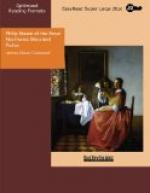Philip’s eyes went to the fire. It was a small fire, burning more brightly as he looked, and he longed to throw himself upon it so that the flames might eat into his flesh. He had mumbled something about police, arrest and murder during the struggle, but DeBar spoke for the first time now.
“You’re cold,” he said.
“I’m freezing to death,” said Philip.
“And I’m—starving.”
DeBar rose to his feet. Philip drew himself together, as if expecting an attack, but in place of it DeBar held out a warmly mittened hand.
“You’ve got to get those clothes off—quick—or you’ll die,” he said. “Here!”
Mechanically Philip reached up his hand, and DeBar took him to his sledge behind the fire and wrapped about him a thick blanket. Then he drew out a sheath knife and ripped the frozen legs of his trousers up and the sleeves of his coat down, cut the string of his shoe-packs and slit his heavy German socks, and after that he rubbed his feet and legs and arms until Philip began to feel a sting like the prickly bite of nettles.
“Ten minutes more and you’d been gone,” said DeBar.
He wrapped a second blanket around Philip, and dragged the sledge on which he was lying still nearer to the fire. Then he threw on a fresh armful of dry sticks and from a pocket of his coat drew forth something small and red and frozen, which was the carcass of a bird about the size of a robin. DeBar held it up between his forefinger and thumb, and looking at Philip, the flash of a smile passed for an instant over his grizzled face.
“Dinner,” he said, and Philip could not fail to catch the low chuckling note of humor in his voice. “It’s a Whisky Jack, man, an’ he’s the first and last living thing I’ve seen in the way of fowl between here and Fond du Lac. He weighs four ounces if he weighs an ounce, and we’ll feast on him shortly. I haven’t had a full mouth of grub since day before yesterday morning, but you’re welcome to a half of him, if you’re hungry enough.”
“Where’d your chuck go?” asked Philip.
He was conscious of a new warmth and comfort in his veins, but it was not this that sent a heat into his face at the outlaw’s offer. DeBar had saved his life, and now, when DeBar might have killed him, he was offering him food. The man was spitting the bird on the sharpened end of a stick, and when he had done this he pointed to the big Mackenzie hound, tied to the broken stub of a dead sapling.
“I brought enough bannock to carry me to Chippewayan, but he got into it the first night, and what he left was crumbs. You lost yours in the lake, eh?”
“Dogs and everything,” said Philip. “Even matches.”
“Those ice-traps are bad,” said DeBar companionably, slowly turning the bird. “You always want to test the lakes in this country. Most of ’em come from bog springs, and after they freeze, the water drops. Guess you’d had me pretty soon if it hadn’t been for the lake, wouldn’t you?”




